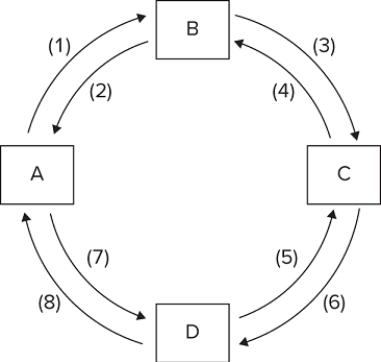Exam 2: The Market System and the Circular Flow
Exam 1: Limits, Alternatives, and Choices107 Questions
Exam 2: The Market System and the Circular Flow287 Questions
Exam 3: Demand, Supply, and Market Equilibrium151 Questions
Exam 4: Market Failures Caused by Externalities Asymmetric Information229 Questions
Exam 5: Public Goods, Public Choice, and Government Failure268 Questions
Exam 6: Elasticity399 Questions
Exam 7: Utility Maximization358 Questions
Exam 8: Behavioral Economics311 Questions
Exam 9: Businesses and the Costs of Production445 Questions
Exam 10: Pure Competition in the Short Run342 Questions
Exam 11: Pure Competition in the Long Run250 Questions
Exam 12: Pure Monopoly407 Questions
Exam 13: Monopolistic Competition279 Questions
Exam 14: Oligopoly and Strategic Behavior362 Questions
Exam 15: Technology, RD, and Efficiency309 Questions
Exam 16: The Demand for Resources359 Questions
Exam 17: Wage Determination168 Questions
Exam 18: Rent, Interest, and Profit305 Questions
Exam 19: Natural Resource and Energy Economics337 Questions
Exam 20: Public Finance: Expenditures and Taxes336 Questions
Exam 21: Antitrust Policy and Regulation264 Questions
Exam 22: Agriculture: Economics and Policy265 Questions
Exam 23: Income Inequality, Poverty, and Discrimination324 Questions
Exam 24: Health Care280 Questions
Exam 25: Immigration259 Questions
Exam 26: International Trade347 Questions
Exam 27: The Balance of Payments, Exchange Rates, and Trade Deficits318 Questions
Exam 28: The Economics of Developing Countries277 Questions
Select questions type
The choice of the most efficient production technique is not affected by how much buyers want to buy the product.
(True/False)
4.9/5  (33)
(33)
"Under central planning, some group has to decide how to get the necessary inputs produced in the right amounts and delivered to the right places at the right time. This is a nearly impossible task without markets and profits." This quotation best identifies the
(Multiple Choice)
4.8/5  (41)
(41)
In a market system, as one industry expands while another contracts, resources will flow
(Multiple Choice)
4.8/5  (35)
(35)
A market system is characterized by the private ownership of resources and the use of prices to coordinate economic activity.
(True/False)
4.8/5  (34)
(34)
"Because the outputs of many industries are the inputs to other industries, the failure of any single industry to fulfil the output quantities specified in the central plan caused a chain reaction of adverse repercussions on production." This quotation best identifies the
(Multiple Choice)
4.9/5  (32)
(32)
The idea that the desires of resource suppliers and firms to further their own self-interest will automatically further the public interest is known as
(Multiple Choice)
4.9/5  (36)
(36)
Which of the following is not a typical characteristic of a market system?
(Multiple Choice)
4.9/5  (34)
(34)
If competitive industry Y is incurring substantial losses, output will
(Multiple Choice)
4.9/5  (36)
(36)
In a market system, more resources will move toward an industry and expand its production if the industry has
(Multiple Choice)
4.8/5  (41)
(41)
All of the following statements describe a market economy except
(Multiple Choice)
4.8/5  (28)
(28)
In a market system, the distribution of goods and services among consumers is largely determined by
(Multiple Choice)
4.8/5  (34)
(34)
Which of the following would not be emphasized in a capitalist economy?
(Multiple Choice)
4.8/5  (34)
(34)
Refer to the provided figure. If box A represents households, B the product market, and C businesses, then flow (2)and flow (4)would represent 
(Multiple Choice)
4.9/5  (37)
(37)
In a market economy, a significant change in consumers' desire for product X will
(Multiple Choice)
4.9/5  (35)
(35)
In terms of the circular flow diagram, households make expenditures in the _____ market and receive income through the _____ market.
(Multiple Choice)
4.9/5  (32)
(32)
Showing 141 - 160 of 287
Filters
- Essay(0)
- Multiple Choice(0)
- Short Answer(0)
- True False(0)
- Matching(0)